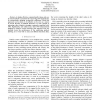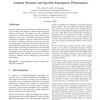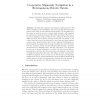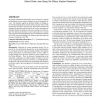151
click to vote
CEC
2011
IEEE
14 years 2 months ago
2011
IEEE
Abstract—A simple, effective, computationally cheap, and easily tuned method is presented for improving PSO performance by automatically adapting acceleration coefficients. Whil...
142
click to vote
TSMC
2010
14 years 8 months ago
2010
In this paper, we propose two novel techniques, which successfully address several major problems in the field of particle swarm optimization (PSO) and promise a significant breakt...
111
click to vote
GEM
2009
14 years 12 months ago
2009
Swarms of microscopic organisms are well known in nature and have been shown to exhibit many unexpected collective behaviours. We model a swarm of artificial animats in a model wh...
139
click to vote
ANTSW
2010
Springer
15 years 4 days ago
2010
Springer
Robot swarms provide a way for a number of simple robots to work together to carry out a task. While swarms have been found to be adaptable, fault-tolerant and widely applicable, d...
155
click to vote
ANTSW
2010
Springer
15 years 4 days ago
2010
Springer
Abstract. In this work, we propose a method for self-organized adaptive task partitioning in a swarm of robots. Task partitioning refers to the decomposition of a task into less co...
147
click to vote
ANTSW
2010
Springer
15 years 4 days ago
2010
Springer
robotics, the agents are often assumed to be identical. In this abstract, we argue that the cooperation between swarms of different kinds of robots can enhance the capabilities of ...
131
click to vote
SAB
2010
Springer
15 years 14 days ago
2010
Springer
We study self-organized cooperation in a heterogeneous robotic swarm consisting of two sub-swarms. The robots of each sub-swarm play distinct roles based on their different charac...
119
click to vote
PODC
2010
ACM
15 years 2 months ago
2010
ACM
We present information-theoretically secure schemes for sharing and modifying secrets among a dynamic swarm of computing devices. The schemes support an unlimited number of change...
148
click to vote
MRC
2003
15 years 3 months ago
2003
Urban search and rescue is a difficult domain for autonomous mobile robots to operate in. The environment can be expected to be highly unstructured, with many obstacles and hazard...
105
click to vote
AAAI
2006
15 years 3 months ago
2006
In this paper we present the Behaviosite Paradigm, a new approach to coordination and control of distributed agents in a multiagent system, inspired by biological parasites with b...




